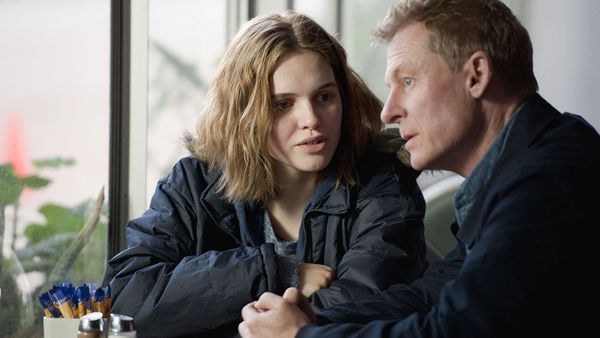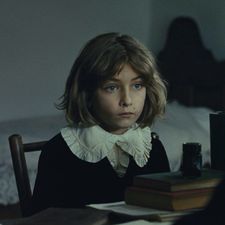 |
| Odessa Young and Richard Roxburgh in Looking For Grace - 'For once the fractured narrative approach really does work.' |
Where Grace is going is initially withheld, instead we see a teenage love affair unfold as she meets a mysterious stranger who seduces her and drives a wedge between the two friends. After spending the night with him, Grace awakes to find him gone – taking her money with him. Just how much has been taken we won’t know for a while; from Grace, Brooks cuts to a series of different characters – notably her parents Dan and Denise (Richard Roxburgh and Radha Mitchell) and the elderly, semi-retired PI who has come on board to help (Terry Norris).
There are some wonderful moments, some provided by Brooks’s self-penned, seriocomic script, others from Katie Milright’s gorgeous cinematography and, for once, the fractured narrative approach really does work. Eagle eyes will work out where the film is going when one vignette ends quite abruptly, and though it does result in somewhat overheated melodrama, Looking For Grace is much more memorable than it might seem at the time. One of the reasons for this is the much buzzed-about newcomer Young, who gives Grace not just a luminosity but a vulnerable quality that’s at odds with her apparent petulance.
 |
| Odessa Young in The Daughter |
As with Looking For Grace, this has its standouts, one of them being Ewen Leslie’s Oliver, Christian’s buddy from youth and breadwinner of the Finch household. Less charismatic is the spiteful and self-obsessed Christian, whose selfish machinations will ruin everyone’s lives with much more finality than the secret he wields. Again, sharp eyes will soon pick enough clues to spot where the narrative is headed – one being the title – but Stone’s insistence on staying true to Ibsen undermines the big reveal. Although it has powerful emotional resonance, the payoff now seems a little old-fashioned and contrived.
 |
| Kristen Stewart in Equals |
It sounds familiar because it is; even if Gattaca hadn’t diluted it for the masses there would still be George Lucas’s THX 1138, to which this film owes such a massive debt, Lucas may well have grounds to repossess Doremus’ house. There’s a bit of subplot involving a resistance movement – a chance to feature supporting stars Guy Pearce and Jacki Weaver – but the sci-fi trimmings all but fall away when Doremus resorts to what he knows bests, which is lots of meaningful close-ups and tinkly music. We know from past experience that he does this very well, but here the backdrop simply isn’t solid or original enough.
No one could say that about Brady Corbet’s debut The Childhood Of A Leader, featured in the Orrizzonti section, which has already been unfairly slammed as “embarrassingly over-ambitious” - as if a 27-year-old American should start with a nice little stoner comedy and stay away from grown-up issues. It is true that the film is divisive, but only in a good way; anyone with a high tolerance for slow, impressionistic cinema will find plenty to get lost in. Though Corbet regularly cites eastern European cinema in his interests, his debut has much more of traditional European feel; indeed it may seem like unfeasibly high praise but there are echoes of the masters (Luchino Visconti, notably) in Lol Crawley’s superb 35mm cinematography.
 |
| The Childhood Of A Leader |
It sounds like a slow-paced chamber piece, and some scenes are, but a brilliant framing device involving a stunning orchestral score by, of all people, Scott Walker gives the film a nerve-wracking urgency. The ending is a what-the-hell talking point for sure, but there are ideas and provocations here that will ensure Corbet’s film lives a long if not especially commercial life.
- Read our report on Black Mass, Spotlight and The Danish Girl.
- Robert Pattinson misses Deauville date - full story.
- Read our report on A Bigger Splash, Heaven Can Wait and Anomalisa.
- More from Venice Film Festival.





















